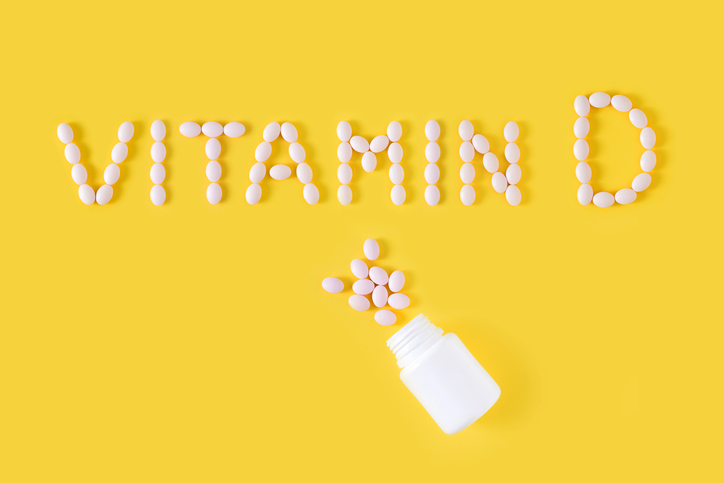You Don’t Want To Be Deficient In Vitamin D, Especially Now

COVID-19 has obviously changed our lives, and we may feel as if we will not have any control over this virus whatsoever until there is a vaccine. This is not entirely true. We can take some control by addressing the existing health issues so many of us have. One of these issues is vitamin D deficiency.
I recently blogged about how vitamin D may provide protection against respiratory infections in general.
”Vitamin D -- the 'sunshine vitamin' -- is thought to protect against respiratory infections by boosting levels of antimicrobial peptides -- natural antibiotic-like substances -- in the lungs,” according to one report discussing a study about vitamin D’s ability to protect against colds and flu.
And now, a recent study that examined COVID-19 cases and mortality rates across 20 European countries found significant evidence which suggests that areas with low average levels of vitamin D not only have more coronavirus cases but also higher rates of death due to the virus.

“Vitamin D modulates the response of white blood cells, preventing them from releasing too many inflammatory cytokines. The COVID-19 virus is known to cause an excess of pro-inflammatory cytokines,” according to one report discussing the European study.
Both Italy and Spain have had high rates of death due to COVID-19. The study showed that these countries also have “...lower average vitamin D levels than most northern European countries.”
“This is partly because people in southern Europe, particularly the elderly, avoid strong sun, while skin pigmentation [pigmentation, so having darker skin, decreases vitamin D production in the skin] also reduces natural vitamin D synthesis.”
Northern Europe is a different story.
“The highest average levels of vitamin D are found in northern Europe, due to the consumption of cod liver oil [a fish oil supplement] and vitamin D supplements, and possibly less sun avoidance. Scandinavian nations are among the countries with the lowest number of COVID-19 cases and mortality rates per head of population in Europe,” according to the report discussing the study.
And we are seeing evidence of the same pattern in other countries, including the United States.
A recent study led by researchers at Northwestern University conducted a statistical analysis of data from hospitals and clinics in China, France, Germany, Italy, Iran, South Korea, Spain, Switzerland, the United Kingdom and the United States.
“The researchers noted that patients from countries with high COVID-19 mortality rates, such as Italy, Spain and the UK, had lower levels of vitamin D compared to patients in countries that were not as severely affected,” according to this report discussing the study.
And just because the U.S. may not have been marked as a region with higher levels of vitamin D deficiency, some reports say that 42 percent of the U.S. population is vitamin D deficient.
Where you live in the U.S. may also play a big part in whether you are vitamin D deficient or not.
For example,“Subjects living at higher latitudes are at increased risk for developing vitamin D deficiency due to decreased UVB radiation reaching the earth's surface, especially during the winter months when the angle of the sun is most oblique. In fact, during the winter months in Boston, (42°N) vitamin D can not be made in the skin between November and February,” reports the National Institutes of Health (NIH).
“Other populations at risk for vitamin D deficiency include African Americans due to melanin effectively absorbing solar radiation between 290 to 700 nm (in the area of vitamin D production), obese patients due to fat sequestration of vitamin D, and patients with fat malabsorbtion,” reports the NIH.
The African American community is already at an increased risk of death from COVID-19 due to high rates of diseases such as diabetes, hypertension, obesity and asthma. So the high risk of being vitamin D deficient due to having darker skin is yet another reason why African Americans need to especially be proactive about making sure their bodies are in the best possible condition to fight this virus off.
And no matter what your race, if you are overweight or obese, this too can cause lower than usual vitamin D levels and may increase your risk of death from COVID-19.
Age and extended hospital stays may also play a role.
“A previous study found that 75% of people in institutions, such as hospitals and care homes, were severely deficient in vitamin D. We suggest it would be advisable to perform dedicated studies looking at vitamin D levels in COVID-19 patients with different degrees of disease severity," according to the report discussing the first study mentioned.
According to this recent Medscape article, vitamin D deficiency is highest among the elderly, institutionalized and hospitalized. In the U.S., 60 percent of nursing home residents are vitamin D deficient and 57 percent of hospital patients are deficient.
The first step is taking a nutrient test in order to determine if you are vitamin D deficient. If the test reveals that you are, a competent healthcare professional can work with you on finding quality vitamin D supplements.
Vitamin D is called the “sunshine vitamin,” because we get this vitamin from the sun’s ultraviolet rays and because there are not many foods that naturally contain vitamin D. You can, however, get this nutrient from vitamin D fortified foods. Milk and orange juice (for example) are often fortified with vitamin D. But to be clear, we mainly have to get our vitamin D through exposure to the sun or through supplementation.
Don’t forget about other vitamins and minerals that may help protect your immune system.
Check out this pH Labs blog about other nutrients that may help keep your immune system in top shape. We recommend the following Vitamin D supplements from Metagenics and Designs For Health. And remember not to overdo it. You can take too much vitamin D so work with a competent healthcare professional and monitor your dosage.
Enjoy your healthy life!
The pH professional health care team includes recognized experts from a variety of health care and related disciplines, including physicians, attorneys, nutritionists, nurses and certified fitness instructors. This team also includes the members of the pH Medical Advisory Board, which constantly monitors all pH programs, products and services. To learn more about the pH Medical Advisory Board, click here.







